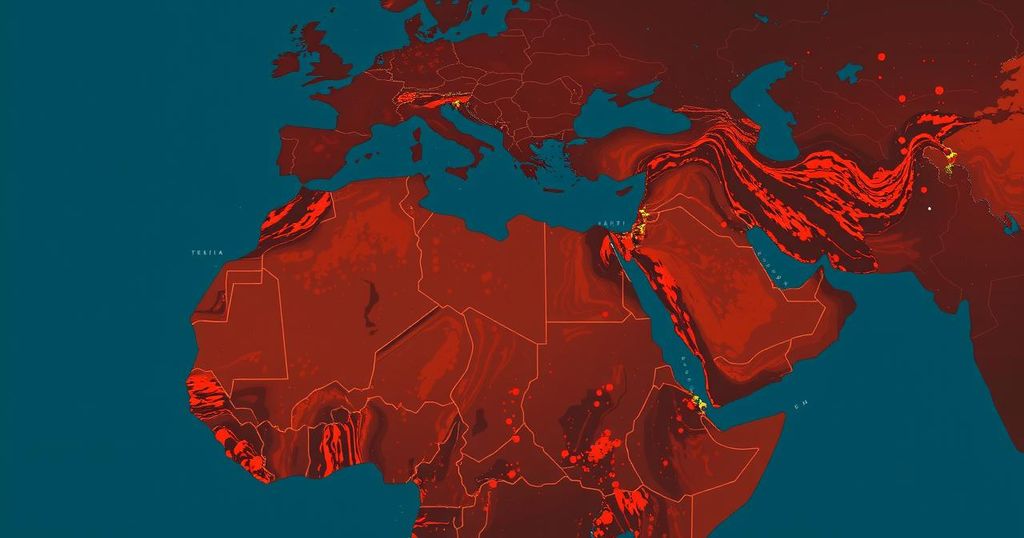The recent summit between Egypt, Eritrea, and Somalia marks a significant geopolitical shift in the Horn of Africa, primarily aimed at countering Ethiopia’s influence amid ongoing tensions over the Grand Ethiopian Renaissance Dam. As regional alliances evolve, the cooperation among these three nations has highlighted security concerns and historical grievances, suggesting a potential escalation in rivalries rather than fostering stability. Ethiopia must respond diplomatically to navigate these complex dynamics and preserve its security in an increasingly volatile region.
The recent summit held between Egypt, Eritrea, and Somalia has highlighted a significant shift in the geopolitical landscape of the Horn of Africa, a region historically characterized by instability and competition. Convened in Asmara, Eritrea, the gathering aimed to establish a coalition against the mutual security challenges posed by regional dynamics, particularly those emanating from Ethiopia, Africa’s second-most populous nation, which plays a pivotal role in the area’s politics. Although the summit projected an image of cooperation and stability, it was primarily an effort to counteract the influence of Ethiopia, which has been the focal point of regional tensions. The official agenda emphasized a pact for bolstered security and autonomy among the three nations, with leaders Isaias Afwerki of Eritrea, Abdel Fattah al-Sisi of Egypt, and Hassan Sheikh Mohamud of Somalia articulating a commitment to territorial integrity and resisting foreign interference. The complex network of alliances within the Horn of Africa has historically placed Ethiopia at its center. Tensions have risen significantly due to Ethiopia’s controversial arrangements, such as a potential maritime deal with Somaliland and ongoing disputes over the Grand Ethiopian Renaissance Dam (GERD). The proposed arrangement sought to grant Ethiopia access to a maritime corridor via Somaliland, which has caused further complications, especially as Somalia has never recognized Somaliland’s independence since it declared secession in 1991. In August, Somalia formalized a military agreement with Egypt, augmenting its existing security ties. Egypt has been supplying military equipment to bolster Somalia’s efforts against the al-Shabaab insurgency. As these alliances evolve, there is a noticeable weakening of Ethiopia’s relationships with its neighbors, contrasted by the growing partnership between Cairo and Mogadishu. Ethiopia’s absence from explicit discussions at the summit underscores its increasing isolation in regional affairs. Concerns surrounding Ethiopia’s actions—especially in relation to the GERD—have compounded alliances against it. The ongoing disputes over water rights and regional power dynamics have led to Egypt pursuing deeper military collaborations with Somalia, as well as engaging in peacekeeping missions aimed at stabilizing the region while curtailing Ethiopia’s influence. Eritrea, often described as the “North Korea of Africa” due to its authoritarian regime, has been aiming to assert itself as a critical regional player since gaining independence from Ethiopia in 1993. The nation’s geographic position near the Bab el-Mandeb Strait enhances its strategic role, especially as it positions itself against the backdrop of Ethiopian expansion. Furthermore, Somalia’s discontent with Ethiopia’s dealings with Somaliland is nudging it closer to Egypt—a traditional rival of Ethiopia. This summit may signify a redistribution of power within the Horn of Africa, breaking traditional alliances. The cooperative efforts of Egypt, Eritrea, and Somalia could indicate a shift towards a more military-oriented strategy designed to counter Ethiopia’s ascendancy. However, the routes of this new partnership may lead to increased tensions rather than stability. The overarching involvement of Egypt in the Horn of Africa, despite geographical separation from Somalia and Eritrea, raises strategic concerns. The nuanced statements from leaders calling for regional peace gloss over the deeper rivalries at play. Observers worry that Egypt’s alignment with Eritrea could be a prelude to a proxy confrontation with Ethiopia over geopolitical interests, particularly in relation to water security. This scenario heightens the security risks for Ethiopia, given Eritrea’s historical enmity towards the Ethiopian government. Potential for escalation looms with the risk of border confrontations and extremist activities in Somalia targeting Ethiopia, creating a precarious situation. Ethiopia must respond with urgency and diplomatic finesse to navigate this evolving threat landscape. Collaboration with international partners, including the United States, remains critical. It may also benefit Ethiopia to strengthen ties with neighboring Kenya and Sudan to create a buffer against emerging threats. Proposing a framework for cooperative management of Nile waters could ease hostilities, yet Ethiopia must be diligent in public diplomacy to clarify its intentions. In a region marked by fragility, Ethiopia’s ability to adeptly manage its alliances will considerably influence its prospects for security and stability.
The Horn of Africa has long been marked by conflict, rivalry, and strategic partnerships. As nations grapple with territorial disputes, ethnic tensions, and the impact of natural resources—most notably water—regional relationships have shifted frequently. Ethiopia has traditionally been at the center of these dynamics due to its size, population, and vital waterway interests, particularly concerning the Blue Nile. The construction of the Grand Ethiopian Renaissance Dam has become a flashpoint in its relations with downstream nations like Egypt. Meanwhile, the recent realignment involving Egypt, Eritrea, and Somalia indicates a strategic effort to counter Ethiopia’s increasing influence in the region while addressing security threats posed by extremist groups and historical grievances that continue to shape the geopolitics of the Horn of Africa.
The recent tripartite summit in Asmara underscores a critical shift in the geopolitical alliances within the Horn of Africa, particularly against the backdrop of Ethiopia’s growing influence and the complexities surrounding the GERD. Egypt, Eritrea, and Somalia appear to be recalibrating their strategies to align against perceived threats from Ethiopia, potentially setting the stage for increased regional tensions. Ethiopia’s approach in managing these new dynamics will be crucial for its future stability and security. A carefully nuanced diplomatic strategy and fostering of regional ties will be essential for mitigating conflicts as the intricate tapestry of alliances continues to evolve.
Original Source: thehill.com






